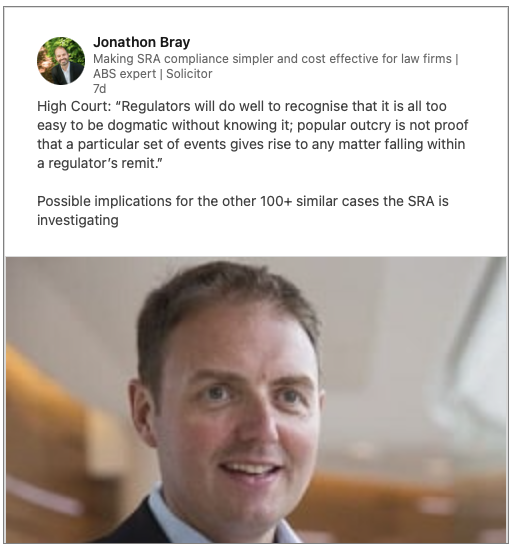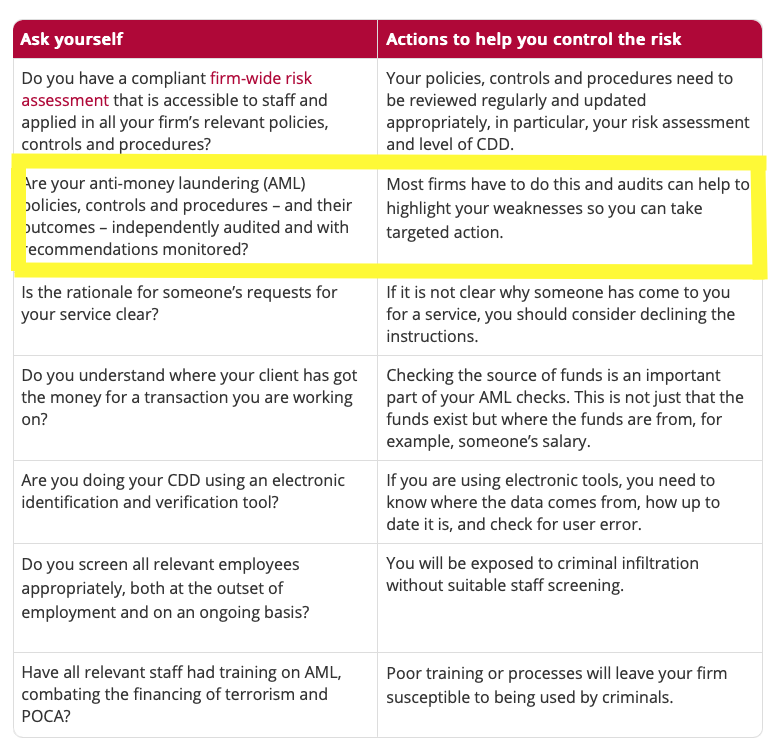Has the SRA banned B2B marketing?

The SRA publicity rules (now contained in Standards 8.8-8.9 of the Code of Conduct and its associated guidance) say that unsolicited approaches to members of the public are forbidden.
‘Members of the public’ is not defined in the rules, and there is some confusion over whether it includes other businesses.
It does not. We have this in writing from the Professional Ethics team.
The SRA also confirmed that making unsolicited social media connections (e.g. LinkedIn) does not constitute an ‘approach’.
The rule is really there to ban ‘targeted and intrusive’ approaches to the public (i.e. individuals). Think ambulance chasing and “we hear you granny passed away, we can do the probate!”
So yes, it is safe for lawyers to do business-to-business (B2B) marketing and make unsolicited approaches to targets – so long as your marketing materials are accurate, not misleading and so on.
Nothing is stopping you from employing a B2B sales team in your firm – from a conduct point of view, at least.
So why aren’t lawyers doing a better job of B2B marketing?
Part of the answer may be that the rules are ambiguous but, compliance aside, there must be other reasons.
We posed this question to Lara Squires of Consortium Business Solutions. She specialises in helping professionals improve their marketing results.
Get Lara’s Top 5 B2B marketing tips
SRA Risk Outlook 2020/2021

The SRA has published its annual Risk Outlook. It appears they have switched the publishing schedule to roughly coincide with the practising year.
Twice a year was a bit much.
In this overview of the latest Risk Outlook, we highlight the key parts of the report, what you should do with the information, and what’s missing.
WHAT IS THE SRA RISK OUTLOOK?
Every year, the SRA compiles a report to identify the key risks to legal practice as viewed by the regulators.
It is organised into themes with commentary. Some risks are born out of SRA-commissioned research. Others are identified through enforcement and disciplinary actions.
Since the SRA works closely with government and other regulators, the regulator has several intelligence sources unavailable to front line solicitors.
The Risk Outlook is also a useful indicator of the direction of travel of SRA policy.
WHAT ARE THE CURRENT RISKS TO THE PROFESSION?
Unsurprisingly, the Risk Outlook 2020/2021 is highly influenced by the coronavirus pandemic (what isn’t these days?), Brexit and ongoing cybersecurity threats. All of these “externalities” can impact the way solicitors can practise and deliver their services.
The SRA has concentrated on 7 priority risks to the profession.
In response, COLPs need to:
- Read the report
- Evaluate how it applies to your firm and update your risk register
- Implement your response to new risks where necessary
- Share your risk response firm-wide and get senior management on board
- Educate and train your staff on the key risks and changes implemented
Find out about the 7 priority risks
Money Laundering Regulations: Are you sure your law firm isn’t caught?

The 5th Money Laundering Directive came into effect on 10th January 2020. With it came a critically important change to the definition of ‘tax advisers’.
This has the potential to bring many more firms (and freelancers) into the scope of the Money Laundering Regulations.
All firms within the scope of the Money Laundering Regulations must be separately approved by the Solicitors Regulation Authority (SRA), or HMRC in the case of Trust and Company Service Providers (TCSPs).
Individual owners and managers of these firms also require authorisation.
Also, departments within larger firms may have been brought into scope, with all the additional AML controls that will entail.
WHAT’S THE CHANGE?
The definition of a Tax Adviser has been broadened considerably. It now includes:
“a firm or sole practitioner who by way of business provides material aid, or assistance, or advice in connection with the tax affairs of other persons, whether provided directly, or through a third party, when providing such services”
The SRA has confirmed that material aid or assistance can be as simple as:
- sending the client a link to specific HMRC information relating to their circumstance
- asking assistance from a tax specialist on a will or an employment settlement.
This is incredibly broad. Anything more than simply pointing at the general HMRC page or saying “get tax advice”, could be enough to pull you into scope.
In summary, you need to check whether any of your practice areas have been brought into scope.
If they have, and you have not yet registered with the SRA for AML purposes, you will need to do so by 10 January 2021.
If individual departments (e.g. employment, personal injury) have been brought into scope, you need to make sure they are following the Money Laundering Regulations to the letter.
Read more to find out if you are a ‘tax adviser’
Guidance

SRA updates
- SRA report on Anti-Money Laundering Visits 2019-2020 – roughly a third of firms fall short of the required AML standards, according to the SRA’s data. Be warned: they are ramping up their AML supervision and enforcement action.
Law Society practice notes and updates
Other updates
- BEIS workplace safety guidance updated – essential reading if your firm is back in the office.
- ICO survey on Children’s Code – we are now in the implementation stage of the Children’s Code. Firms affected have until 2 September 2021 to comply. The ICO wants feedback on the code and what advice and resources they should provide.
Beckwith case commentary
Former Freshfield partner’s successful appeal reopens questions about the SDT, principles-based regulation and the ethics of our private lives
Mr Beckwith has successfully appealed his SDT fine (ostensibly for “lack of integrity). This was a flagship SRA prosecution, covered extensively by the legal and national press.
The High Court was unusually critical about the SDT’s decision, the SRA’s reach into solicitors’ private lives and the “alarming” prosecution costs.
The case is almost certainly destined for appeal by the SRA.
Questions that need to be answered:
- Should cases of sexual misconduct, without criminal allegations, fall within the regulator’s disciplinary remit?
- How far should the SRA be allowed to reach into our private lives?
- What does “integrity” actually mean? Is it fair to make such an uncertain concept a core pillar of professional conduct?
- What happens to all the other sexual misconduct cases the SRA says it is investigating? At one point, they were talking about 117 cases.
- How much should the mood of public opinion affect the regulator’s eagerness to prosecute? Do we go back to “historic” cases of sexual misconduct?
Further reading
- Professor Steven Vaughan’s excellent analysis of the High Court judgment in the Lawyer Watch blog: Personal Lives and Professional Principles: Beckwith, Integrity and the High Court
- Comment in the Gazette from Greg Treverton-Jones, co-author of the Law Society’s Solicitors Handbook: Solicitors’ sex lives ‘their own business’, says regulation guru
Question of the week

“Do we really need to commission an independent AML audit?”
Regulation 21 of the Money Laundering Regulations 2017 (I refuse to type out the legislation’s full title) states that “where appropriate with regard to the size and nature of its business“, firms must “establish an independent audit function“.
So far, the SRA has taken a rather relaxed view of this requirement.
But the mood music is definitely changing. We anticipate this is going to next on the SRA’s hit list.
AML is a priority risk in the SRA’s latest Risk Outlook. They expressly state that most firms should independently audit AML systems and controls:
In the COLP and COFA conference last week, the SRA Anti-Money Laundering team suggested that only sole practitioners would be exempt. And even sole practitioners, it was noted, might choose to buddy-up with a friendly competitor to “mark each other’s homework”.
So what is an independent audit function?
It means putting in place a regular audit (not necessarily annual) of the effectiveness of your AML systems and controls.
Yes, this can be done internally. But not by the same person responsible for implementing your AML processes.
Or you can outsource it, of course. The benefit of doing that might include objectivity, lack of internal politics, and saving fee-earning time.
Disciplinary decisions

- Jonathan Thomas Gorman – struck off for a string of failings, including dishonesty, partly motivated by his close links with a property developer.
- Seatons Law Limited – firm fined £14,000 for missing mahoosive AML red flags in property transactions. One senses this was an opportunity by the SRA to lay down a marker in light of its recent warnings that firms need to improve their due diligence processes.
- Craig Nicholas Hollingdrake and Peter Jan Bujakowski fined £7,500 and £20,000 respectively for their involvement in a dubious car park investment scheme. The scheme saw more than £100m pass through their firm’s client account between 2011 and 2016. The COLP avoided sanction. Reading between the lines, the SRA considered the scheme to be dubious and against the public interest, but the solicitors were merely found to have breached the Accounts Rules.
- Richard Clive Hallows – struck off for taking client money and covering it up with an elaborate fraud involving a shell company. The client account shortfall was £885k at the point of SRA intervention.
Section 43 orders barring non-qualified staff from the legal profession
- Hannah Jones – paralegal mislead clients about the progress of their cases
- Geraint Lewis – Eversheds paralegal forged supervisor’s signature
- Stephanie Jones – accounts staff member convicted of housing benefit fraud
- Wendy Outhwaite – secretary fraudulently inserted herself into a client’s estate
- Emily Elizabeth Bale – paralegal dishonestly covered up a missed court hearing
- Helen Erotokritou – a support staff member misused an interest-free loan from her employer for travel expenses
- Elaine Saunders – graduate CILEX member was culpable for her involvement in a car park investment scheme (along with Peter Jan Bujakowski and Craig Nicholas Hollingdrake, above)








